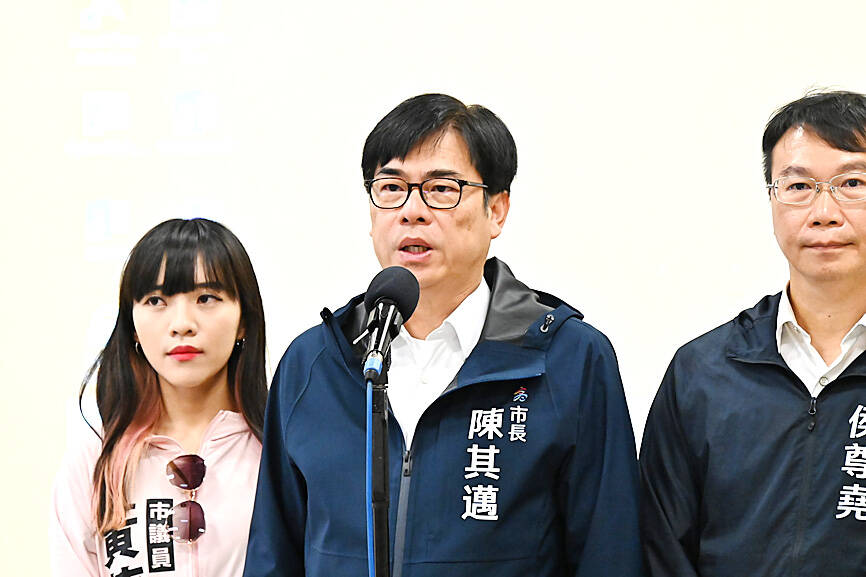The Kaohsiung City Government yesterday said it was working on procedures to cope with a major adjustment by Taiwan Semiconductor Manufacturing Co (TSMC, 台積電) to make advanced chips — likely 2-nanometer — at a new factory in the city, rather than legacy chips.
In April, TSMC said it was considering whether to make more advanced semiconductors in Kaohsiung, other than 3-nanometer chips — the most advanced chips available now.
It said the cutting-edge semiconductors would be produced at its new factory in Nanzih Technology Industrial Park (楠梓科技產業園區), which it had originally planned to use for 28-nanometer chips.

Photo: Huang Liang-chieh, Taipei Times
TSMC has said it expects its next-generation 2-nanometer technology to enter mass production in 2025 at its Hsinchu and Taichung factories.
The Kaohsiung factory would be the third capable of producing 2-nanometer chips, if the plan is confirmed.
To avoid overcapacity, the world’s biggest contract chipmaker decided not to make 28-nanometer chips in Kaohsiung, TSMC chief executive officer C.C. Wei (魏哲家) told investors in April.
TSMC is building 28-nanometer chip capacity at a new factory in Japan and adding 28-nanometer capacity to its fab in Nanjing, China, Wei said, adding that it is also considering building a third fab in Europe to make 28-nanometer chips for vehicles.
TSMC informed the Kaohsiung City Government about its change in plans early this year, Kaohsiung Mayor Chen Chi-mai (陳其邁) told reporters yesterday.
The city government has been closely communicating with the chipmaker to satisfy its needs, which include water and electricity consumption, Chen said.
“The city government will fully support TSMC in making those changes,” he said.
“The industrial park is adjusting related items catering to the operation of this advanced plant and preparing to review the environmental impact comparative analysis report [from TSMC],” the Kaohsiung Economic Development Bureau said in a statement. “The construction work on the new fab is ongoing.”
The bureau declined to confirm a report yesterday by the Chinese-language United Daily News, saying that TSMC planned to further upgrade the Kaohsiung fab for 2-nanometer capacity to meet demand for artificial intelligence (AI) chips.
TSMC supplies AI chips to Nvidia Corp and Advanced Micro Devices Inc (AMD) among other customers.
AMD chief executive officer Lisa Su (蘇姿丰) arrived in Taipei yesterday on a four-day trip to visit the company’s local suppliers, including TSMC; hardware and component suppliers Pegatron Corp (和碩) and Quanta Computer Inc (廣達); and motherboard makers Micro-Star International Co (MSI, 微星) and Gigabyte Technology Co (技嘉), a source familiar with her itinerary said, asking to remain anonymous.
Analysts said Su’s planned meetings have raised hopes that AMD, one of the world’s foremost semiconductor development companies, will forge closer ties with Taiwan’s semiconductor industry and companies in the AI server supply chain.
Her visit comes less that two months after Nvidia chief executive officer Jensen Huang (黃仁勳) visited Taiwan and stirred up an AI frenzy.
Su is also scheduled to attend a conferral ceremony on Thursday to accept an honorary doctorate degree from National Yang Ming Chiao Tung University.
Additional reporting by CNA

CHAMPIONS: President Lai congratulated the players’ outstanding performance, cheering them for marking a new milestone in the nation’s baseball history Taiwan on Sunday won their first Little League Baseball World Series (LLBWS) title in 29 years, as Taipei’s Dong Yuan Elementary School defeated a team from Las Vegas 7-0 in the championship game in South Williamsport, Pennsylvania. It was Taiwan’s first championship in the annual tournament since 1996, ending a nearly three-decade drought. “It has been a very long time ... and we finally made it,” Taiwan manager Lai Min-nan (賴敏男) said after the game. Lai said he last managed a Dong Yuan team in at the South Williamsport in 2015, when they were eliminated after four games. “There is

Chinese Nationalist Party (KMT) lawmakers have declared they survived recall votes to remove them from office today, although official results are still pending as the vote counting continues. Although final tallies from the Central Election Commission (CEC) are still pending, preliminary results indicate that the recall campaigns against all seven KMT lawmakers have fallen short. As of 6:10 pm, Taichung Legislators Yen Kuan-heng (顏寬恒) and Yang Chiung-ying (楊瓊瓔), Hsinchu County Legislator Lin Szu-ming (林思銘), Nantou County Legislator Ma Wen-chun (馬文君) and New Taipei City Legislator Lo Ming-tsai (羅明才) had all announced they

Nvidia Corp CEO Jensen Huang (黃仁勳) yesterday visited Taiwan Semiconductor Manufacturing Co (TSMC, 台積電), as the chipmaker prepares for volume production of Nvidia’s next-generation artificial intelligence (AI) chips. It was Huang’s third trip to Taiwan this year, indicating that Nvidia’s supply chain is deeply connected to Taiwan. Its partners also include packager Siliconware Precision Industries Co (矽品精密) and server makers Hon Hai Precision Industry Co (鴻海精密) and Quanta Computer Inc (廣達). “My main purpose is to visit TSMC,” Huang said yesterday. “As you know, we have next-generation architecture called Rubin. Rubin is very advanced. We have now taped out six brand new

POWER PLANT POLL: The TPP said the number of ‘yes’ votes showed that the energy policy should be corrected, and the KMT said the result was a win for the people’s voice The government does not rule out advanced nuclear energy generation if it meets the government’s three prerequisites, President William Lai (賴清德) said last night after the number of votes in favor of restarting a nuclear power plant outnumbered the “no” votes in a referendum yesterday. The referendum failed to pass, despite getting more “yes” votes, as the Referendum Act (公民投票法) states that the vote would only pass if the votes in favor account for more than one-fourth of the total number of eligible voters and outnumber the opposing votes. Yesterday’s referendum question was: “Do you agree that the Ma-anshan Nuclear Power Plant